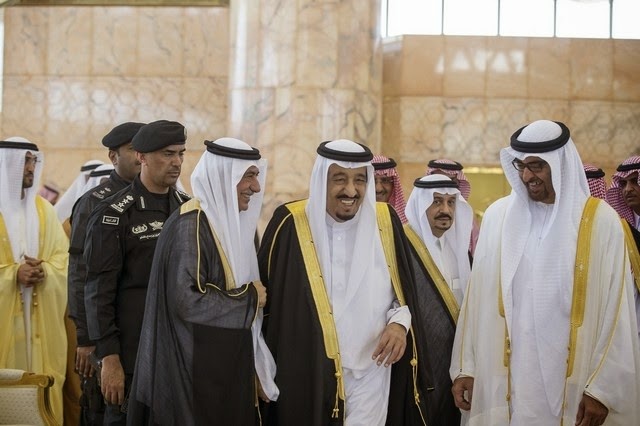ABU DHABI // Sheikh Mohammed bin Zayed, Crown Prince of Abu Dhabi and Deputy Supreme Commander of the Armed Forces, met with Saudi Arabia’s new King Salman bin Abdulaziz Al Saud on Monday, as conflicts in the region escalated.
The official visit to Riyadh came as Egypt bombed ISIL targets in Libya and Shiite Houthi militiamen prepared for an offensive against Sunni tribes in Yemen.
The unrest is threatening key allies of both the UAE and Saudi Arabia and officials from the two countries have urged a strong response from the international community.
A squadron of the UAE’s F-16s, currently deployed in Jordan, carried out fresh strikes on ISIL on Monday, targeting oil refineries in an effort to stem the group’s funding sources, state news agency Wam said.
The talks between Sheikh Mohammed and King Salman at the king’s palace focused on enhancing bilateral cooperation in various fields, and regional and international developments, the Saudi Press Agency said. Coordination and cooperation on the conflicts in Syria, Iraq, and Yemen were discussed, according to Wam.
The threat posed by the Houthis was expected to be a key point discussed, said Mustafa Alani, the director of security and defence studies at the Geneva-based Gulf Research Centre.
The outcome of talks between world powers and Iran over its controversial nuclear programme were also likely to be on the agenda.
“The two men will have a long list of strategic issues which pose threats to all states in the region, especially the GCC states,” he said, adding that while the two leaders have met in the past, the meeting will be especially important because King Salman only ascended to the throne last month.
Sheikh Mohammed’s delegation to Riyadh included Sheikh Hamdan bin Mohammed, Crown Prince of Dubai and Sheikh Saif bin Zayed, Deputy Prime Minister and Minister of the Interior. Sheikh Tahnoun bin Zayed, Deputy National Security Advisor and Dr Anwar Gargash, Minister of State for Foreign Affairs, also attended the talks, along with a number of senior members of the Saudi royal family.
A number of other officials have also visited Riyadh in recent weeks, including Kuwait’s Emir Sabah Al Ahmad Al Jaber Al Sabah, who met with King Salman, and Turkey’s interior minister Efkan Ala, who met with Saudi Arabia’s deputy crown prince and interior minister Mohammed bin Nayef.
On Sunday, the United Nations security council unanimously adopted a resolution demanding that the Houthis “immediately and unconditionally” withdraw their forces from Yemen’s government institutions. The resolution also demanded that the Houthis release Yemen’s former president, Abdrabu Mansur Hadi, who remains under house arrest, and engage in UN-backed negotiations.
The Houthis, a Zaydi Shiite militia accused of ties to Iran, took over Sanaa in September and have continued to expand in the west and south of the country.
The group now aims to control Yemen’s energy-rich Marib province, which is home to Sunni tribes with links to Saudi Arabia.
Gulf Cooperation Council foreign ministers had urged the UN security council to adopt a resolution over the Houthis under Chapter 7 of the UN charter, which would have allowed for the use of military force.
“I think the very strongly worded statement that was just issued by the Gulf Cooperation Council and which invoked the UN Charter’s Chapter Seven, was a clear indication of the seriousness with which the GCC takes the situation,” said Fahad Nazer, an analyst at Virginia-based consultancy JTG Inc and a former political analyst at the Saudi embassy in Washington.
Mr Nazer added that while Saudi Arabia and Oman, which both share borders with Yemen, are especially concerned by the risk posed by unrest there, it would not be “reasonable” to expect other GCC members to prioritise the country in the same way.
The UAE, Saudi Arabia, Bahrain, and Qatar are already involved in carrying out air strikes on ISIL as part of the United-States led coalition against the group. With the US unlikely to commit resources to countering the Houthi expansion, regional powers are believed to want military force to be an option in Yemen if the group fails to implement the security council resolution.
The UAE closed its embassy in Sanaa last Saturday, following similar moves by Saudi Arabia and the United States.
The Houthis’ takeover of Sanaa, along with accusations of its ties to Iran, risks inflaming sectarian tensions in the Sunni-majority country and could result in increased recruitment for Al Qaeda in the Arabian Peninsula. Already, the threat of civil war is looming as the Houthis prepare for an offensive in Marib and citizens in the south clamour for succession.
The Houthis have also attacked inside Saudi Arabia in the past.
In November 2009, the group took over Saudi territory near the border and dozens were killed over the following weeks before the Houthis withdrew.
“I think that given Yemen’s proximity to Saudi Arabia and the tendency of the violence and political turmoil in Yemen to spillover across Saudi territory, one would be hard to pressed to think of another conflict in the region that the Saudis would consider to be of a more immediate threat to their security,” said Mr Nazer.
THÔNG TIN THANH TOÁN & DỊCH VỤ:
- Tên tài khoản: Nguyễn Anh Tuấn
- Số tài khoản: 0501000058467
- Ngân hàng TMCP Ngoại thương Việt Nam (Vietcombank) - Chi nhánh Bắc Sài Gòn
- Hỗ trợ cài đặt: fb.com/kequaduongvodanh
- Dịch vụ: Xem chi tiết >>
+ Nhận convert template từ Wordpress
+ Sửa lỗi, nâng cấp template
+ Thiết kế Form Liên hệ từ Google Form







